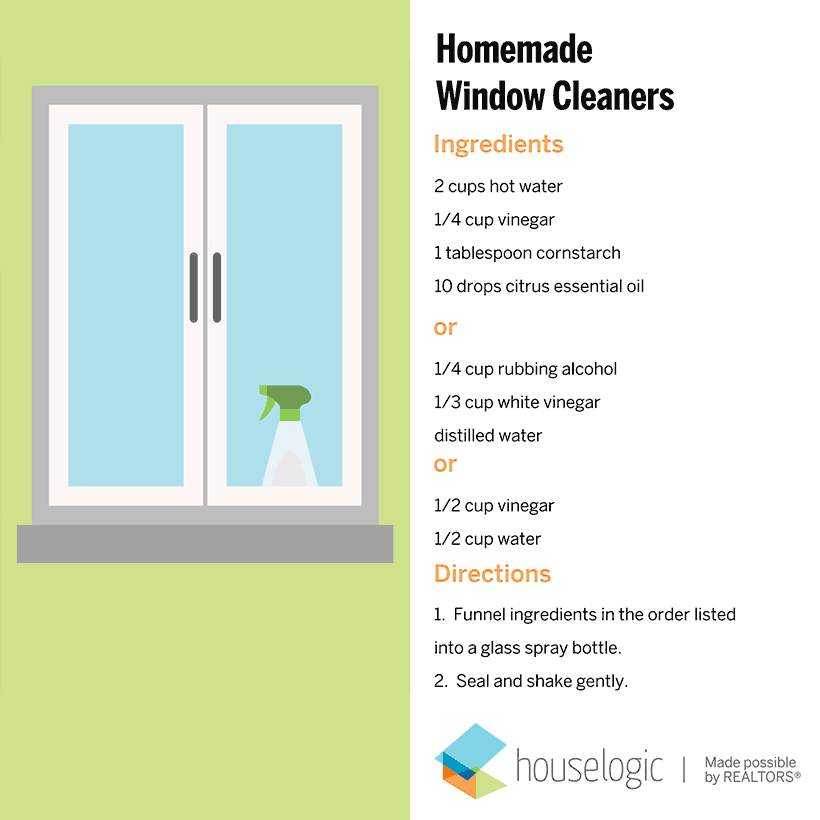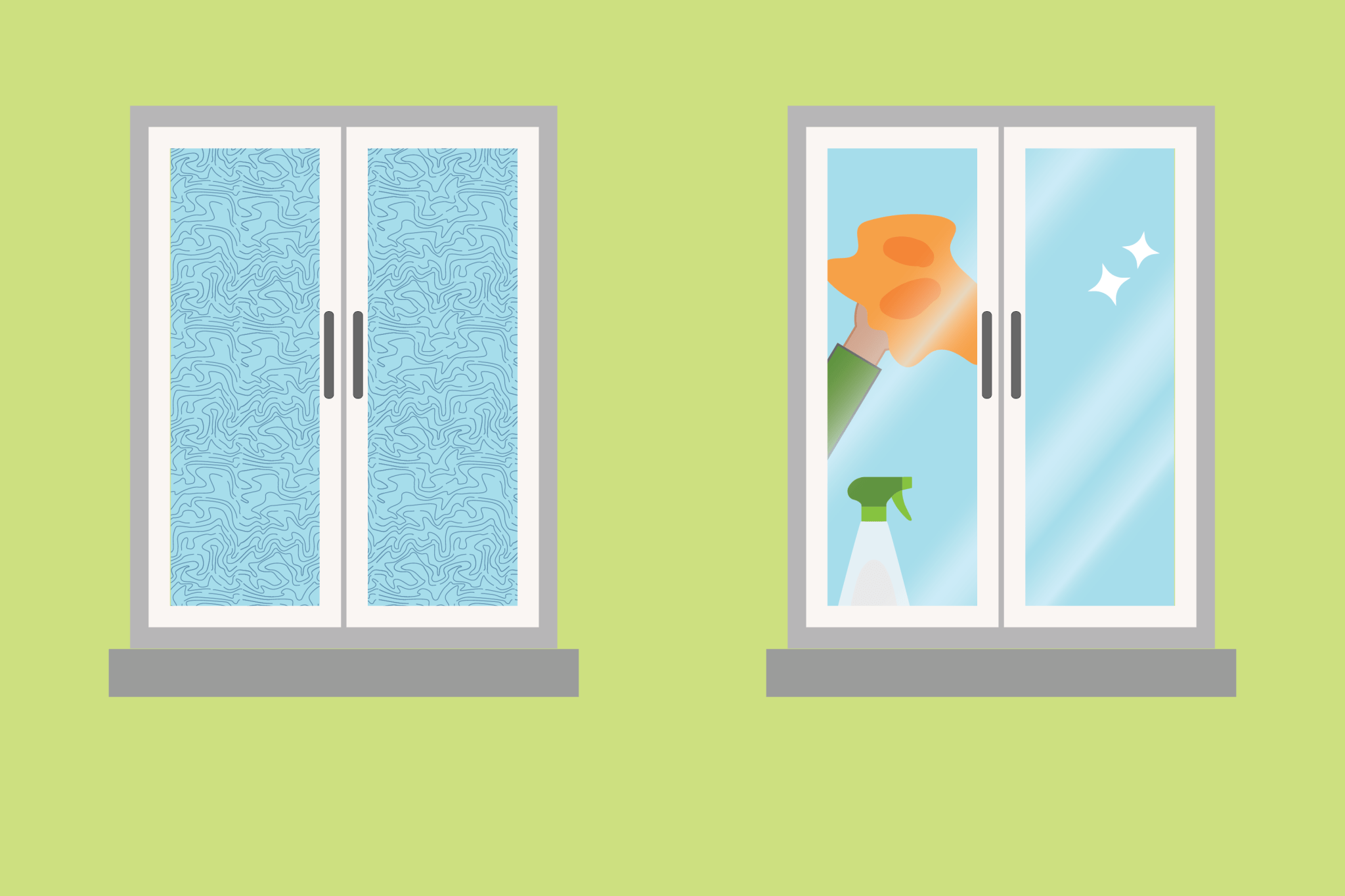Whether your windows are covered with a filmy residue or kids’ fingerprints, marks on windows can be quite the eyesore. Yet many commercial glass cleaners are loaded with toxic chemicals and therefore aren’t the most green option to get your home windows clean.
Find out the benefits of homemade window cleaners, like savings and having fewer harsh chemicals around the house. And get several DIY streak-free recipes you can put together in minutes to keep your glass shining.
Benefits of Homemade Window Cleaner
Glass surfaces are loaded with bacteria from sticky fingers and germs.
It’s easy to grab a bottle of cleaner at the grocery store. But cleaning your windows with store-bought glass cleaner might miss the mark when it comes to creating a bacteria- and smudge-free space that also has few or no harsh chemicals.
#1 Commercial Window Cleaner Is Full of Toxins
Full of harsh chemicals, commercial window cleaners might seem like they clean your windows, but in reality, they are just filling your home with toxins.
Most glass cleaners in stores contain ingredients like ammonia, butyl Cellosolve, and ethanol. These harsh chemicals pose serious health risks to you and your family — especially if you have small children or pets.
#2 DIY Window Cleaners Are Eco-Friendly
Homemade glass cleaners and other DIY cleaning products can keep your home spotless, and they’re an eco-friendly alternative to conventional options.
Most homemade cleaners are made with natural ingredients like vinegar, lemon juice, cornstarch, and water — all of which are gentle on the environment and your health.
In addition, they don’t come in plastic bottles that will end up in a landfill. With homemade glass cleaner, you can choose and reuse your own glass spray bottle.
DIY window cleaner is a budget-friendly way to clean your windows without sacrificing your well-being or the environment.
#3 Homemade Cleaners Are More Affordable
Having clean windows and surfaces should not be something you have to budget for. However, many commercial window cleaners can be costly and don’t even work that well.
If you scope out store brands of glass cleaners, the average bottle can cost up to $6. This average price increases even more for cleaners for glass surfaces like car windows or exterior windows.
But with a DIY solution, you can clean all of your windows for pennies on the dollar.
#4 You Can Customize Window Cleaner for Your Family
Making a cleaning solution at home also allows you to customize your cleaning solution to your liking. Whether you’re planning to do a quick cleanup or deep clean the windows, a personalized product will make the end results a little more pleasant.
For example, if you’re using homemade glass cleaner for baby rooms or kids’ play areas, you can add a few drops of lavender oil to help relax and soothe your little ones.
You can also add a few drops of essential oils to your DIY recipes for a fresh, clean scent. We love using citrus oils like lemon or orange because they smell great and have natural cleaning properties.
Homemade Window Cleaning Recipes
Not only will at-home glass cleaners keep your windows clean, but depending on the natural ingredients you choose, they can improve your household’s mood.
Each cleaner recipe will leave your home with a fresh feeling — not to mention save you money.
Here are three recipes you can make at home to get the clean windows you want.
Fresh Vinegar and Cornstarch Window and Glass Cleaner
This vinegar and cornstarch DIY solution will help lighten the air in your home, creating refreshing vibes.
What you’ll need:
- Glass spray bottle
- 2 cups of hot water
- ¼ cup of vinegar
- 1 tablespoon of cornstarch
- Up to 10 drops of citrus essential oil (optional)
To begin, combine the water and vinegar in your clean spray bottle. Then, add the cornstarch and essential oil (if using) to the mixture. Put the lid on your spray bottle and shake well to combine the ingredients.
It’s that easy!
After spraying your mixture, wipe the surface with a lint-free cloth.
Vinegar and Alcohol DIY Glass Cleaner
Using white vinegar and rubbing alcohol helps shine any glass surface and works for many other cleaning tasks, too.
Rubbing alcohol is a great cleaning agent because it evaporates quickly and doesn’t leave any streaks.
When you mix it with vinegar, a natural disinfectant, you have a homemade window cleaner that can remove bacteria and grime from your windows.
What you’ll need:
- Spray bottle
- ¼ cup of rubbing alcohol
- 1/3 cup of white vinegar
- Distilled water
Combine the 1/4 cup rubbing alcohol and white vinegar in the spray bottle with distilled water, then gently shake.
For an energy booster, add up to 10 drops of lemon juice. The lemon juice will be a wake-up call for your senses and add to the disinfecting power of the mixture.
The Best Homemade Vinegar Window Cleaner
A DIY glass cleaning solution can really be as easy as 1...2...
That’s it! You don’t even need a 3.
Scummy shower doors and muggy outdoor windows stand zero chance against some of the most wholesome DIY glass cleaners.
What you’ll need:
- Vinegar
- Water
Combine equal parts of warm or hot water and vinegar into a glass spray bottle and let the mixture do its magic.
You can use this solution on its own or follow up with a clean microfiber cloth to ensure a brilliant shine.

Tips for Streak-Free Windows
Keeping your glass crystal clear can be a hard task to master.
The ingredients in your homemade recipe evaporate quicker than those in commercial products, especially when using warm water or in warm weather. These cleaning tips will ensure a mark-free window.
- Use a clean cloth to avoid smears or consider using a paper towel for the first wipe to remove any residue. To prevent water spots, dry your windows before they dry on their own.
- Choose a lint-free cloth to quickly wipe the surfaces. This will decrease the time needed to achieve immaculate glass.
- Use a squeegee or magic eraser on shower windows, outside windows, or other glass surfaces that get direct sunlight.
- When cleaning outside windows, be sure to use a separate cloth (one for inside and one for outside) to avoid transferring dirt, pollen, and grime back into your clean house.
- Use eco-friendly paper towels and quickly wipe any excess liquid off the window that could leave streaks. Standard paper towels tend to leave lint residue, but most eco-friendly paper towels will leave surfaces lint-free.
With these window cleaning tips, you’ll achieve the fresh, clean feeling and surfaces you’re looking for.
And now that you know how to make your own window cleaning solution and have a few recipes to follow, you can start helping the environment, reduce your spend, and keep your windows clean, all at the same time.
Recipe sources are Connecticut Department of Energy & Environmental Protection; Cornell Cooperative Extension Hamilton County; FixR; NYC Health; and University of Arkansas Division of Agriculture Research & Extension.
